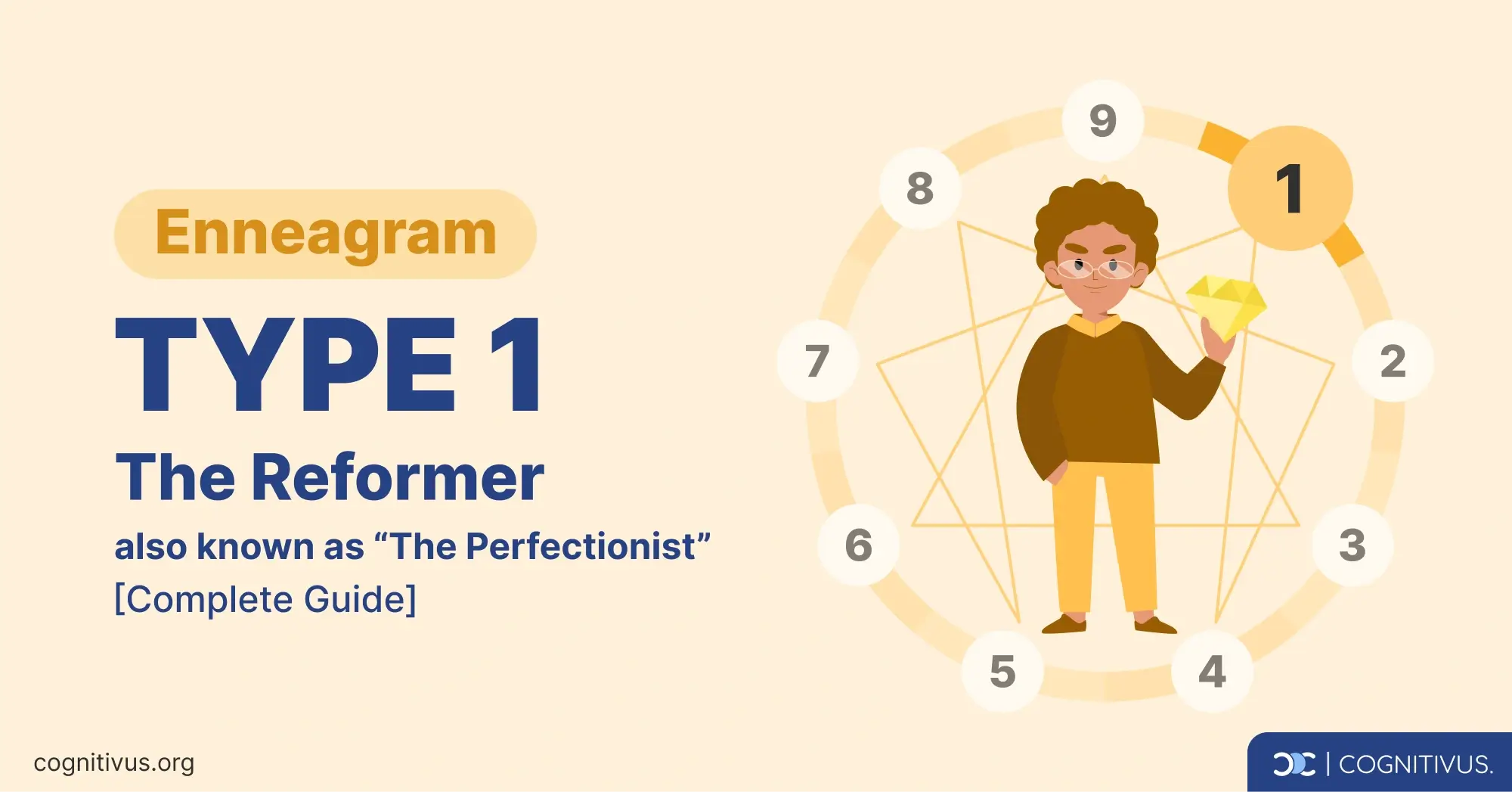Welcome to our comprehensive guide on Enneagram Type 1, also known as the Perfectionist. This guide will help you understand the core characteristics, strengths, weaknesses, emotional complexities, and more about Type Ones.
Whether you see yourself as a Type One or you are curious about someone who fits this description, this guide offers valuable insights.
1. Enneagram Type 1 Description
Key characteristics of type ones
Enneagram Type Ones, called Perfectionists or Reformers, are known for being conscientious and detail-oriented individuals. They strive for excellence in everything they do at all costs.
If you're a Type One, your rigorous standards and principled approach guide your actions. You likely set high standards for yourself and others, driven by a sense that anything less than perfect is unacceptable. This constant pursuit of perfection means you're always looking to improve everything around you, including yourself.
However, this can lead to being overly critical, especially towards yourself. Imagine yourself in a garden, carefully nurturing each plant. While others might admire the beautiful array of flowers, you can’t help but notice a tiny imperfection in just one petal and feel the urge to adjust it. This is what drives you to create something beautiful, but it can also make you overlook the beauty that's already there, focusing too much on getting every detail just right.
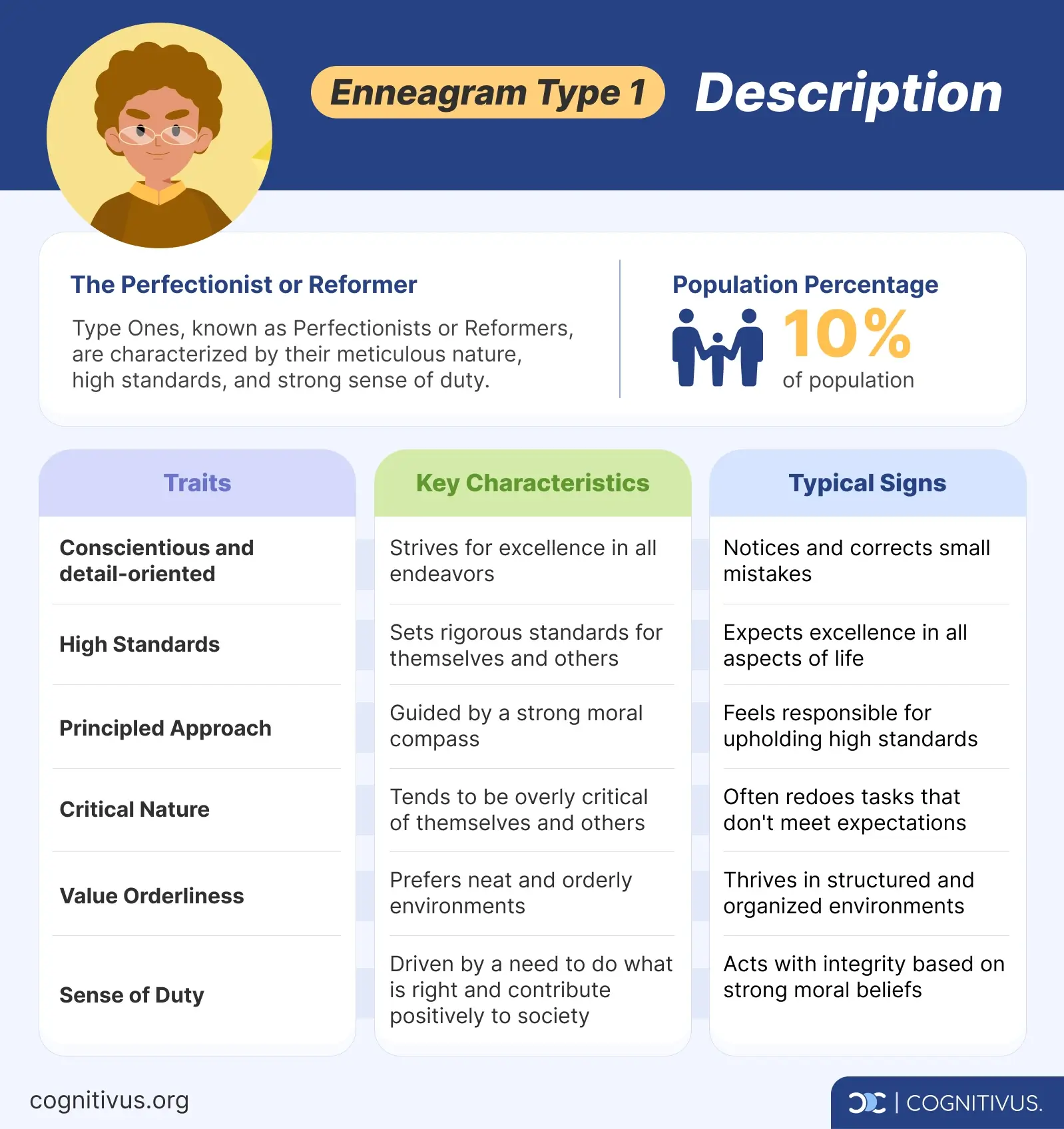
How to recognize an Enneagram type 1
Here are some signs that show that you – or someone else – is an Enneagram Type One:
- Attention to detail: I notice and correct small mistakes. Whether it's spotting a typo in a report or ensuring that a picture frame is perfectly straight, I am meticulous in my observations.
- High standards: I set and expect high standards in everything I do, striving for excellence at work, in my hobbies, and in my personal life.
- Strong sense of duty: I feel a strong sense of responsibility and duty, driven by a need to do what is right and to contribute positively to society.
- Critical nature: I am often self-critical or critical of others when things aren't perfect, aiming to ensure high standards are met. For instance, I might find myself redoing tasks that don’t meet my expectations.
- Value orderliness: I prefer things to be neat and orderly. I thrive in environments with clear rules and routines, such as keeping your workspace impeccably organized or maintaining a well-structured daily schedule.
- Ethical behavior: Guided by a strong moral compass, I strive to act with integrity, making decisions based on what I believe is right, even when it's challenging.
These signs can be very telling, but oftentimes a deeper exploration of one's habits and motivations is needed to accurately determine Enneagram types. This can be done through an Enneagram test.
How rare is type one?
Most statistics show that Type 1s make up about 10% of the population. While Type One is not exceptionally rare, it is also not the most common type. It falls somewhere in the middle of the distribution spectrum for Enneagram types.
Here are more details about the prevalence of Type 1s:
- Gender distribution: Research specifically examining gender distribution within Type 1 is limited, but like other personality traits, Type 1 is not inherently tied to gender. Instead, societal, cultural, and motivational factors may influence how its traits are expressed and perceived across different genders.
- Cultural and demographic variations: The prevalence of Enneagram types can vary significantly across different cultures and demographic groups. For example, cultures that highly value efficiency, precision, and adherence to rules may foster the development of Type 1 traits. Similarly, people who grow up in environments where they frequently criticized for not meeting high expectations may develop Type 1
- Comparative rarity: Type 1 is not typically considered the rarest type, but it tends to be less common compared to other types. Types like Type 2 (The Helper), Type 8 (The Challenger) and Type 5 (The Investigator) are often considered less common, while Type 6 (The Loyalist) and Type 9 (The Peacemaker) are frequently cited as more prevalent.
It’s good to keep in mind that the method of assessment (self-reported surveys, professional evaluations, etc.) can influence the reported prevalence of Type One. People may also have varying levels of self-awareness or understanding of the Enneagram, which affects the accuracy of self-typing. Additionally, those who are more interested in personal growth or self-awareness might be more likely to participate in Enneagram assessments, potentially not truly representing the overall population.
2. Emotional Traits of Type One
Core fear and desire
At the heart of a Type One lies a core fear: the fear of making mistakes or being morally wrong. This fear drives a deep desire for integrity.
If you are a Type One, you typically strive to be good, ethical, and balanced. Living in harmony with your values is essential to you. This core desire shapes every choice you make, often showing as a commitment to improvement and meticulous attention to detail.
For example, at work, you might spend extra time double-checking reports to ensure there are no errors. At home, you might feel compelled to keep your living space organized and clean, making sure everything is in its proper place. In your interactions with others, you might carefully choose your words to avoid misunderstandings and ensure you are always fair and just.
A gut-driven nature
Enneagram Type Ones belong to the body-based triad, along with Types Eight, Nine. Those in this triad are driven by their gut instincts and physical sensations.
Type Ones, with their strong connection to their physical presence, indeed trust their gut instincts much like a surfer trusts the wave. They are constantly attuned to the nuances of their environment. This allows them to react instinctively to what feels right or wrong, shaping their decisions and interactions with the world.
The core emotion associated with this triad is anger, which manifests in different ways for each type. For Type Ones, this often shows up as a sense of frustration or resentment when things aren't perfect.
Strengths and weaknesses
Like all Enneagram types, being a type 1 comes with its strengths and challenges. Let’s explore them.
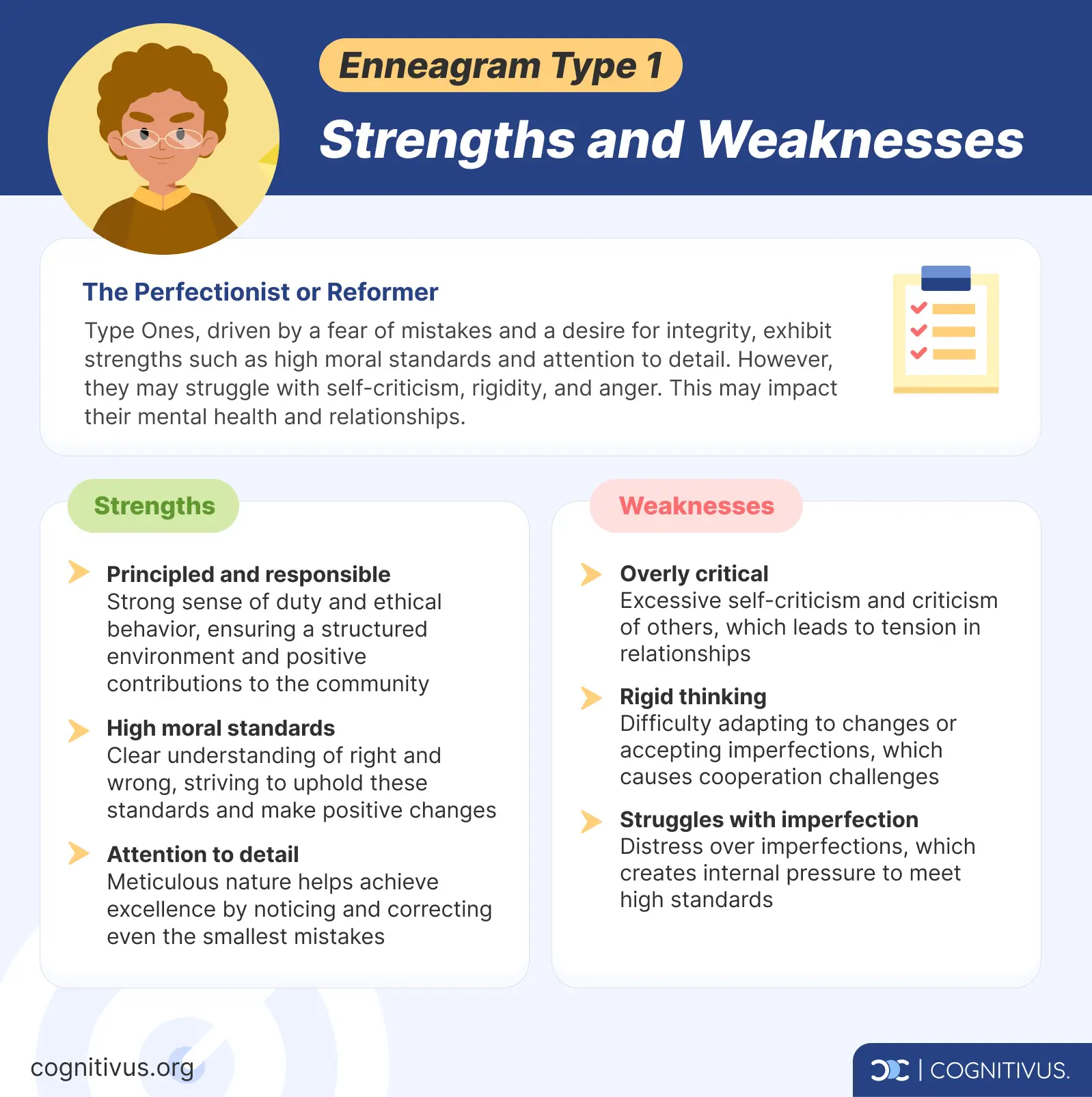
Strengths of type one
- Principled and responsible: As a Type One, you have a strong sense of responsibility and structure your environment. Your deep commitment to doing what is right and ethical contributes you to feel focused, maintaining efficacy of your surroundings.
- High moral standards: You have a clear sense of what is right and wrong, and you strive to uphold these standards in all aspects of your life, contributing to make positive changes in your communities and the world.
- Attention to detail: Your meticulous nature ensures that you notice and correct even the smallest mistakes. This trait helps you achieve excellence in your endeavors.
Weaknesses of type one
- Overly critical of self and of others: Your high standards can lead you to be overly critical, both of yourself and those around you. This can create tension and dissatisfaction in your relationships.
- Rigid in thinking and behavior: You may struggle with flexibility, finding it difficult to adapt when things do not go as planned. This rigidity can make it hard to accept imperfections, which can make it hard to cooperate with others.
- Struggles with imperfection: Imperfections, whether in yourself or in others, can lead to significant distress. Your excessive worry about doing things right can create internal pressure to meet your own high standards.l.
- Anger and resentment: You might feel a continual, internal battle against imperfections, both personal and external. This can manifest as internal anger often directed at yourself or resentment towards others. When things don’t align with your ideals, the anger and resentment often shows up with a sense of frustration and injustice.
- Impact on mental health: Your high standards and self-criticism can take a toll on your mental health. Without an outlet or understanding of these emotions, you may feel overwhelmed, which can lead to chronic tension or even burnout.
3. Enneagram Type 1 Wings Explained
In the Enneagram system, wings are adjacent types that add unique flavors to your core personality. Think about your Enneagram type as the main melody of a song, your wings are the harmonies that add depth, making your song unique. If you identify as a Type One, the perfectionist with a stringent adherence to principles, your wings would be either Nine or Two, shaping your approach to life and the things you value.
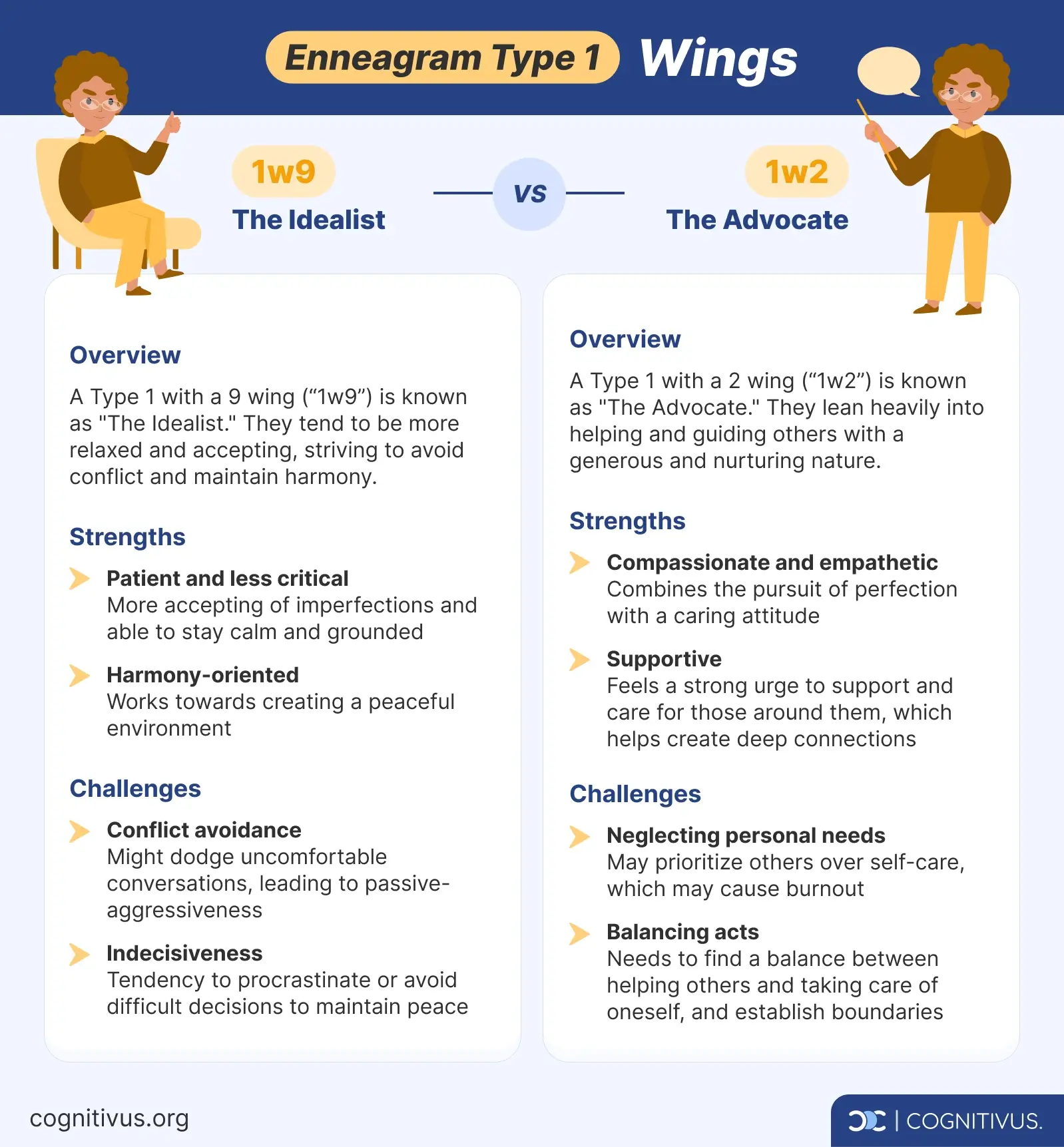
Enneagram type 1 wing 9
A Type One with a Nine wing (1w9) is often known as "The Idealist." If you are a Type One with a Wing 9, you lean towards being more relaxed and accepting. You may work hard to avoid conflict and maintain harmony.
This wing can make you more patient and less critical. You might find it easier to go with the flow and accept things as they are. This balance can help you stay calm and grounded, even when things are not perfect.
This can be a strength, but be mindful about the potential challenges. Your aversion to conflict might lead you to dodge uncomfortable conversations, avoiding addressing issues, which in turn could brew into passive-aggressiveness. Similarly, your strong desire to preserve peace can result in indecisiveness or procrastination when faced with difficult decisions. These are not flaws, but recognizing these patterns enables you to take proactive steps towards staying true to your principles of integrity and harmony.
Enneagram type 1 wing 2
Contrastingly, a One with a Two wing (1w2), dubbed "The Advocate," leans heavily into helping and guiding others.
If you are a Type 1 Wing 2, you tend to have a generous nature, similar to an Enneagram Type 2. This Enneagram wing makes you more nurturing and empathetic. You feel a strong urge to support and care for those around you, often enjoying making a difference in people’s lives.
This wing combines your pursuit of perfection with a compassionate and nurturing attitude. This caring approach can soften your critical side, allowing you to connect deeply with others
This can be very rewarding, but be careful not to neglect your own needs. It’s important to find a balance between helping others and taking care of yourself. Remember that you're not just focused on achieving perfection; you're also dedicated to fostering deep connections, supportive environment. Thus, don't forget to prioritize your personal needs and establish boundaries.
4. Enneagram Type 1 Subtypes Explained
Beyond wings, Enneagram Type 1s also have subtypes based on their dominant instinctual drives: Self-Preservation, Social, and Sexual (or One-to-One).
These subtypes add another layer of complexity to the personality type, influencing behavior and motivations in different ways.
- Self-preservation type 1 (1SP): This subtype concerns personal safety, comfort, and well-being. They strive for perfection in maintaining a sense of stability and security in their environment. Health becomes a top priority for them, not only as a means of physical well-being but also as a cornerstone of stability and security in life.
- Social type 1 (1SO): This subtype concerns how they fit into social groups and larger communities. They strive for perfection in their roles and responsibilities within these groups, driven by a sense of duty and justice. They often feel responsible for advocating societal values, justice, and making a positive impact.
- Sexual type 1 (1SX): This subtype focuses on one-to-one relationships and intense connections with others. They strive for perfection in their close relationships and often have a strong passion for improving and deepening these connections. They invest their energy to pursue excellence in their relationships, fostering greater harmony and authenticity.
5. Healthy and Unhealthy Levels of Type 1
It’s important to be kind to yourself and remember that everyone has ups and downs. With that said, understanding the various levels of health within the Type 1 depending on how you manifest your core motivations and behaviors can guide you back to a balanced state.
Here’s different healthy levels of Type a:
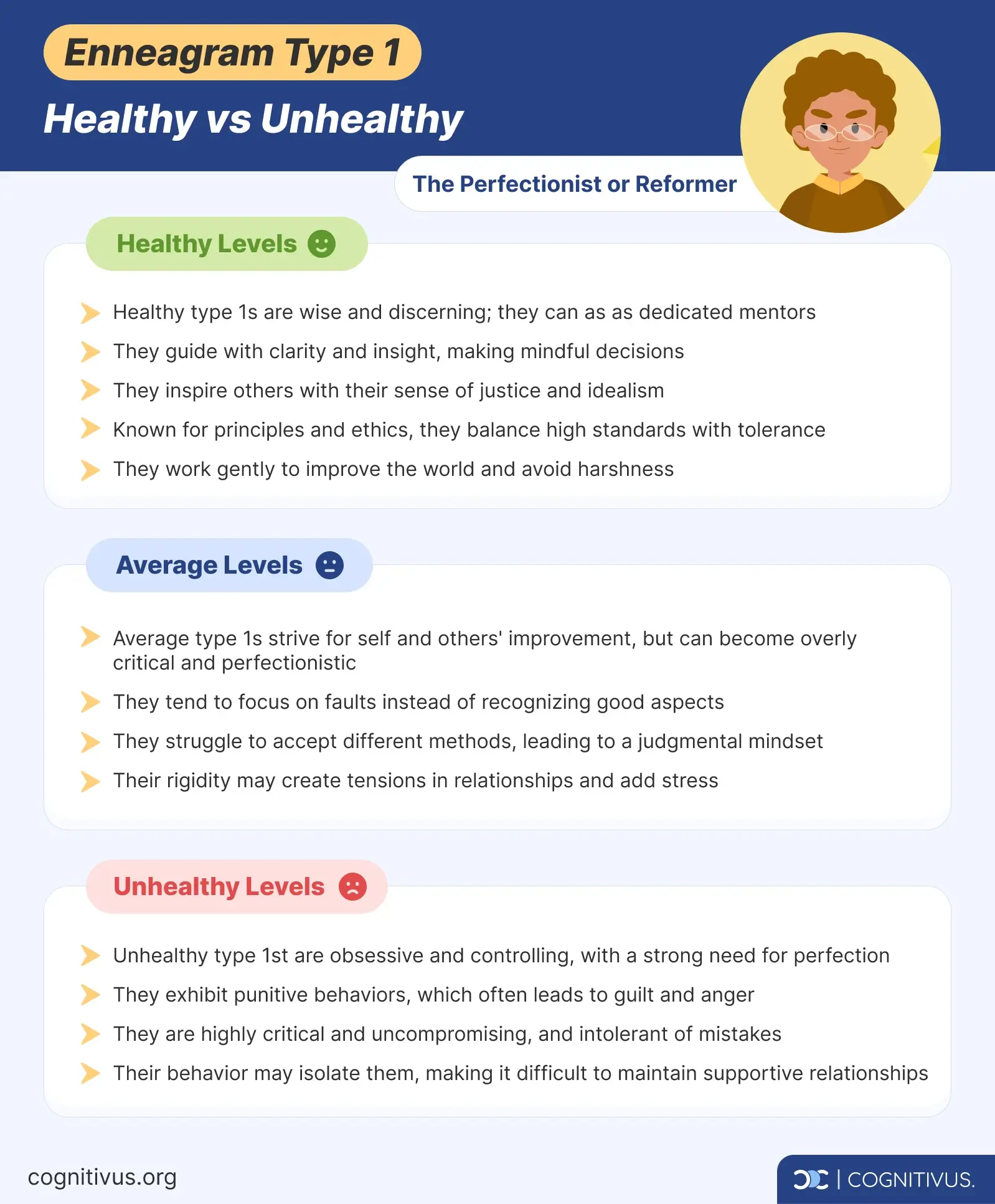
Healthy levels of type 1
At their best, Type 1s are wise and discerning. Like a dedicated mentor, they guide themselves and others with clarity and insight and approach decisions with mindfulness, navigating life with a realistic and noble perspective. They are the ones who inspire others with their sense of justice and idealism.
Type 1s are known for their principles and ethics, consistently sticking to their values with self-control even when it’s hard. This balance between high standards and tolerance allows them to see the good in both themselves and others. As a result, they work tirelessly to make the world a better place, all with a gentle approach that avoids harshness.
Average levels of type 1
Operating at an average level, Type 1s continue to strive for improvement in themselves and those around them. However, this drive can sometimes lead them to become overly critical and perfectionistic. They may find themselves focusing too much on what is wrong rather than recognizing what is right. Even when something is right, Type 1s might struggle to accept different ways of doing things, sticking rigidly to their own methods, leading to a judgmental and inflexible mindset.
Accepting different methods and viewpoints becomes a challenge, creating tension in their relationships and adding to their stress. Despite their good intentions, this critical outlook can create barriers rather than build bridges, hindering collaborations and connections.
Unhealthy levels of type 1
In their most unhealthy state, Type 1s can become obsessive and controlling. The intense need for perfection can lead to punitive behaviors, leaving them strong feelings of guilt and anger.
Unhealthy type 1s are highly critical and uncompromising, struggling to tolerate the smallest mistakes both in themselves and others. Their intolerance can push people away, as they are unable to meet rigid expectations.
This makes it difficult for them to maintain healthy and supportive relationships, often leading to isolation and increased frustration.
6. Enneagram Type 1 in Relationships and Work
Enneagram type 1 at work
Being a Type One in the professional world comes with distinctive strengths and challenges. Your high standards and unwavering commitment to quality make you a valuable asset in any work environment. You are often the one who upholds excellence, ensuring that projects not only meet but exceed expectations. This dedication to doing things 'the right way' can drive success and inspire those around you to follow suit, setting the standard for quality in the workplace.
However, your quest for perfection can sometimes lead to significant stress. The pressure to maintain security and order, coupled with a loud inner critic when things go astray can impede progress. Imagine this: You meticulously prepared a flawless presentation, but a glitch appears on the screen, disrupting your carefully crafted message. Your inner critic immediately kicks in, lashing you for not meeting your own high standards. In that moment, a minor error feels like a monumental failure, undermining your hard work.
Learning to balance your drive for perfection with the understanding that mistakes are part of the process is crucial. Instead of letting imperfections overwhelm you, embracing them can help you manage stress and maintain a healthy work-life balance. By doing so, you'll not only alleviate stress but also nurture a more supportive and compassionate workplace culture, fostering deeper connections among colleagues
Enneagram type 1 in relationships with friends and family
In relationships, Type 1s bring the same level of integrity they apply to their work. As a type 1, you value honesty and responsibility, which makes you a trustworthy and dependable friend and family member. Your loved ones know they can count on you for support. You are there in times of need, earning you a reputation for being trustworthy. Your dedication to doing what is right makes you a pillar of strength in your personal circles.
You strive to maintain high ethical standards in your interactions, cultivating strong and meaningful connections. Your instinct might be to hold them to the same high standards you hold yourself, but it’s essential to understand and respect the imperfections of your loved ones. Relationships thrive on acceptance and mutual support. Recognizing that no one is perfect, including yourself, and learning to accept flaws can help develop more harmonious and fulfilling relationships.
Enneagram type 1 in romantic & love relationships
In romantic relationships, Type 1s are known for their dedication and commitment to their partners.
You are the partner who values deep, meaningful connections and strives to build relationships that reflect your core values. This commitment often translates into a stable and reliable partnership.
However, your high expectations - both for yourself and your partner - can sometimes pose challenges. While striving for a relationship that reflects your ideals and values can drive growth, it’s important to temper these expectations with understanding and compassion. It's not about perfection but embracing the authentic aspects of your partner can lead to a deeper, more fulfilling connection
Constructive communication is a hallmark of Type One relationships. You are all about clear and honest dialogue, addressing issues with a focus on improvement and growth. This commitment to communication fosters a healthy and evolving partnership.
Moreover, you encourage mutual growth and support. You're a firm believer in relationships where both partners can support each other’s development, creating a strong foundation for a lasting bond. Striking a balance where you can express your ideals without imposing them, and where you can embrace the uniqueness of your partner, becomes the aspiration. This balance nurtures both you and your partner, enriching mutual respect and acceptance.
7. How to Grow as a Type 1 Person
As a Type 1 person, personal growth involves recognizing your strengths and addressing areas where you may struggle. Embracing self-compassion and acknowledging that imperfection is a part of life are key steps toward unleashing your true potential.
As American researchers highlight, engaging deeply with the Enneagram allows individuals to recognize the limitations of their value systems and work toward an integrated worldview that fosters the growth of others, particularly for Type 1s. This deeper understanding can lead to greater empathy, improved relationships, self-observation skills and a more nuanced comprehension of their motivations.
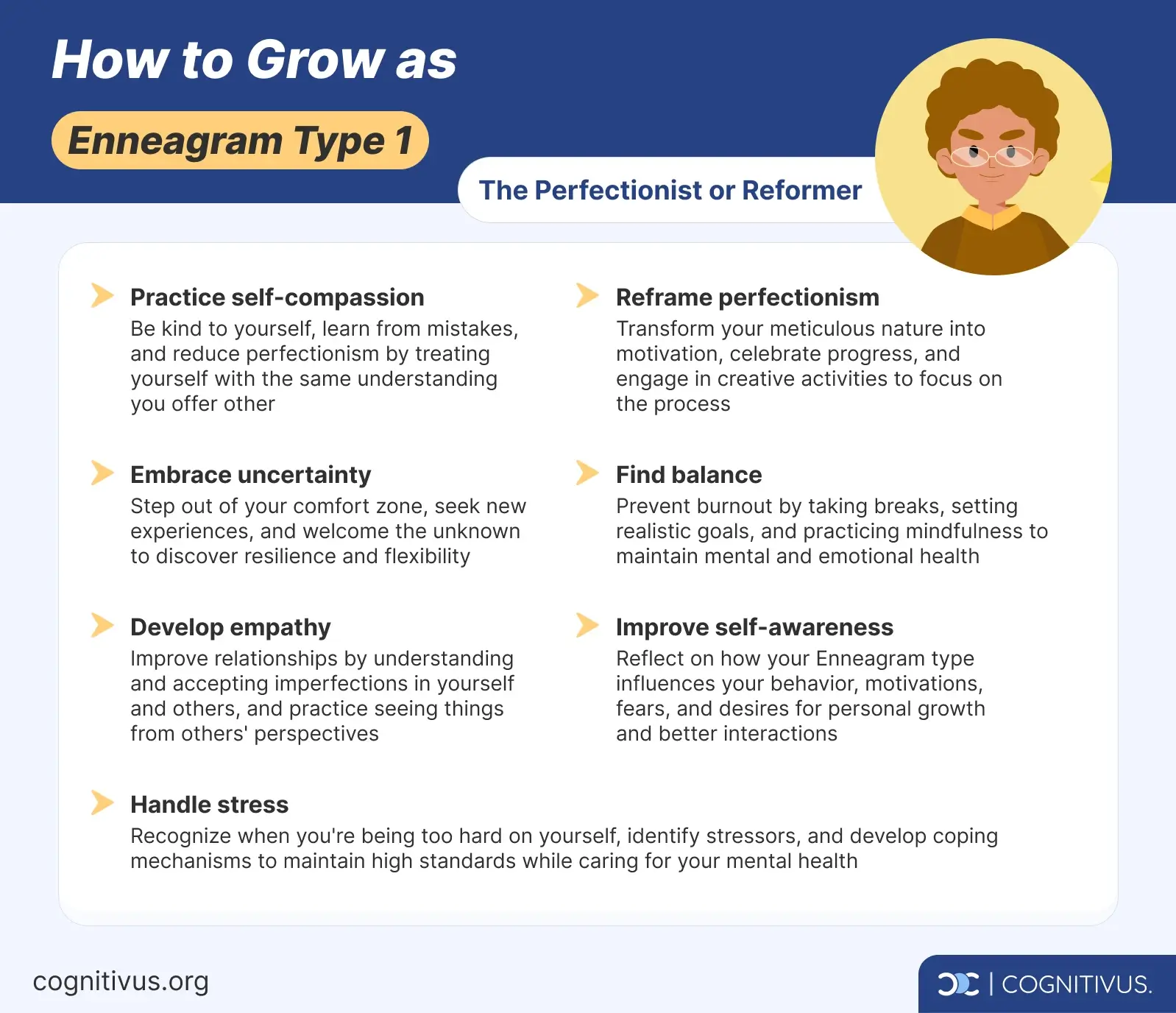
Here are 7 growth tips to help you thrive:
1. Practice self-compassion
As a Type 1, you often struggle with being too hard on yourself.
Learning from mistakes is crucial for personal growth. Instead of dwelling on errors, allow yourself to move forward. Embrace the idea that everyone makes mistakes and that these are opportunities for learning and growth. Treat yourself with the same kindness and understanding that you offer to others. Being kind to yourself can reduce the burden of perfectionism and promote a healthier mindset. By practicing self-compassion, you can alleviate some of the self-imposed pressure and find more joy in your accomplishments. Try starting your day with positive affirmations; breathing deeply to let go of stress; talking to yourself like you would a friend when you make a mistake.
2. Reframe perfectionism
Your meticulous nature, while a strength, can become a source of immense stress.
Transform your perfectionism into a positive force for inspiration and motivation rather than criticism. Let it encourage you to strive for your best without becoming overly critical. Focus on the progress you make and the high standards you achieve, rather than fixating on flaws. Celebrate small wins to recognize your progress and resilience, which can enhance your life, making it more fulfilling and productive. By seeing perfectionism as a guide rather than a goal, you can recognize that each step forward is a part of your drive for excellence, which brings you closer to your goals. Consider engaging in a creative activity, like painting, writing, or another form of artistic expression, where the focus is on the process rather than the end result.
3. Embrace uncertainty
While Type 1 individuals often find comfort in predictability and control, personal growth and reaching your potential lie beyond boundaries of certainty.
Seek out new experiences that challenge your notions of perfection. Stepping out of your comfort zone can help you grow and adapt. You could try embracing spontaneity by making plans without extensive preparation or overthinking, which may disrupt the rigidity of perfectionism. It's in moments of uncertainty that you discover resilience, flexibility, and essential qualities for personal and professional growth. By welcoming the unknown, you unlock the path to discovering new aspects of yourself with an open mind and curiosity.
4. Find balance
Like a slackline walker, balancing on a thin rope high above the ground, needs to take breaks to maintain their balance, it's essential for Type 1s to find moments of recharge in their pursuit of perfection to prevent burnout.
Developing strategies to manage stress effectively is key. That’s why taking regular breaks, setting realistic goals, and practicing mindfulness can prevent feeling overwhelmed. Incorporating such practices into your daily routine can help you to maintain your mental and emotional health. By finding balance, you can sustain your high standards without sacrificing your well-being.
5. Develop empathy
A common challenge for Type 1s is being overly critical of others.
Understanding and accepting imperfections in yourself and others can improve your relationships and self-awareness. Practice putting yourself to others' perspectives and acknowledge that everyone has their own struggles and strengths. By acknowledging others’ perspective, you can build a more empathetic understanding, leading to deeper connections and a more compassionate outlook.
6. Improve your self-awareness
Type 1s can easily be caught up in external standards, sometimes overlooking their internal motivations. Delving deep into their inner world could indeed enable them to align their actions with their authentic selves - that's what self-awareness is like.
Spend time understanding how your Enneagram type influences your behavior. Reflect on your motivations, fears, and desires related to perfectionism. Is it about a desire for approval from others, a fear of failure, maybe a sense of inadequacy within yourself, or feeling a sense of inner peace? This self-awareness can lead to personal growth and improved interactions with others, as you become more attuned to your own needs and the needs of those around you.
7. Handle stress
The constant pursuit of perfection often brings significant stress.
First, recognize when you are being too hard on yourself and give your mind and body the chance to recharge. Next, identify what's stressing you out. Once you know the stressors in your life, you can develop coping mechanisms that allow you to handle challenges more effectively. By managing stress, you can maintain your high standards while also caring for your mental health. However, if the stress becomes overwhelming and you find yourself unable to cope, you may have to reassess your standards temporarily. So, It's about finding the right balance between striving for perfection and prioritizing your mental health.
8. Enneagram Type 1 Careers and Hobbies
Best jobs for type one
Type Ones thrive in roles that value principles, structure, and high standards. Careers such as teaching, counseling, and activism are well-suited for them. These professions allow Type Ones to channel their desire for improvement and their commitment to ethical standards into meaningful work. Let’s see how this plays out:
- In teaching, they can guide and inspire students. They can foster a love for learning and personal growth in their students.
- In counseling, they can offer support and guidance, helping others navigate their challenges with integrity and compassion.
- Activism allows Type Ones to fight for justice and positive change, aligning with their core values.
When it comes to work environments, type Ones excel in roles that require attention to detail and adherence to high standards. Jobs like project management, quality control, and auditing are perfect, as they demand responsibility and precision. These positions leverage their natural ability to focus on details and uphold stringent standards, making them invaluable assets to any team.
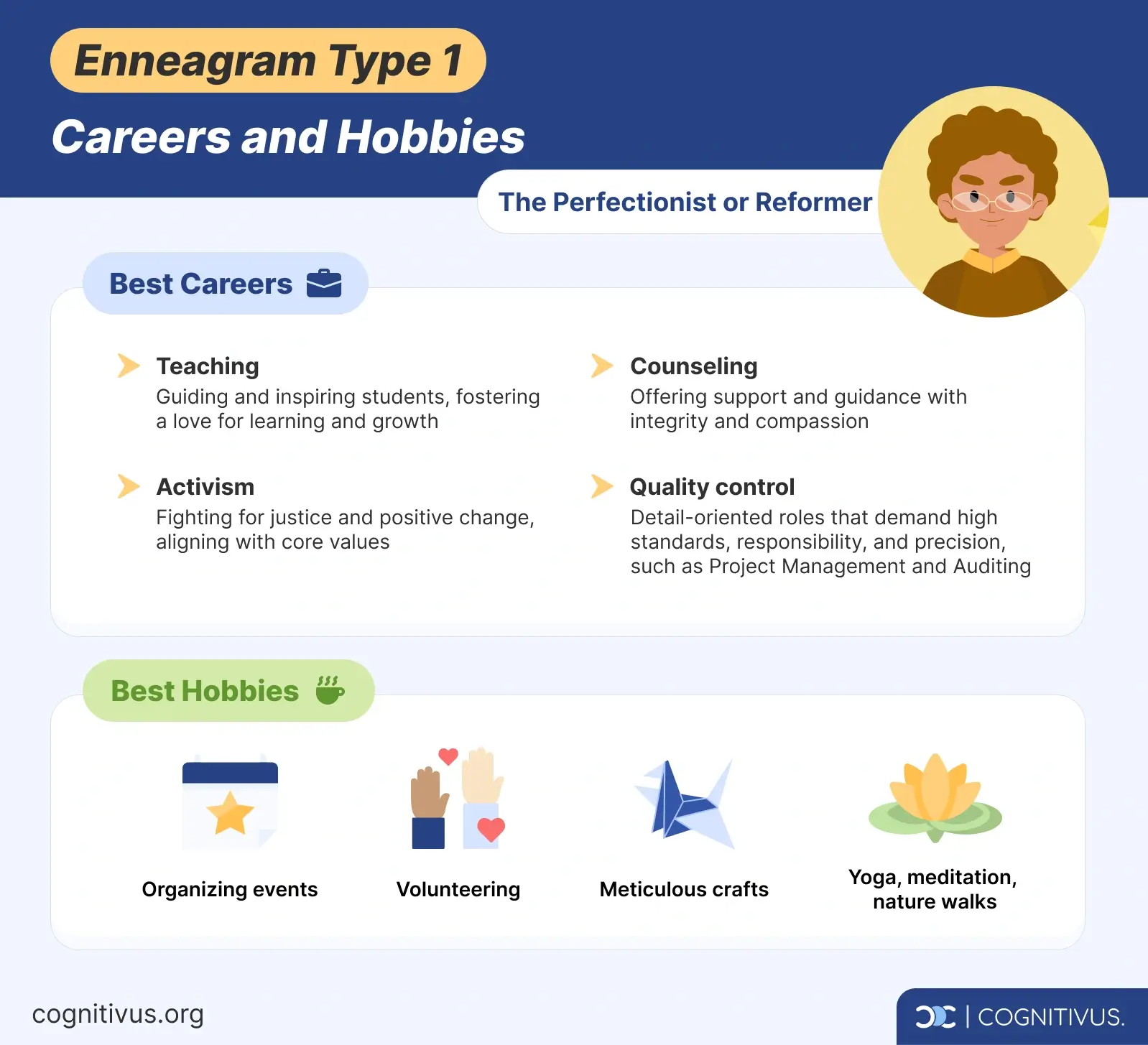
Best hobbies and interests for type one
Type Ones enjoy activities that align with their high standards and desire for improvement. Organizing events, whether for community groups or personal gatherings, allows them to apply their meticulous planning skills. Volunteering provides a sense of purpose and aligns with their values of service and integrity. Engaging in meticulous crafts or hobbies, such as woodworking, gardening, or quilting, can be fulfilling as they allow for creativity while maintaining structure and precision.
To balance their driven nature, Type Ones should also consider hobbies that promote relaxation and mindfulness. Yoga, meditation, and nature walks can help them unwind and find peace. These activities encourage them to embrace the present moment and reduce stress, supporting their overall well-being.
9. Enneagram Type 1 Compatibility and Relationships
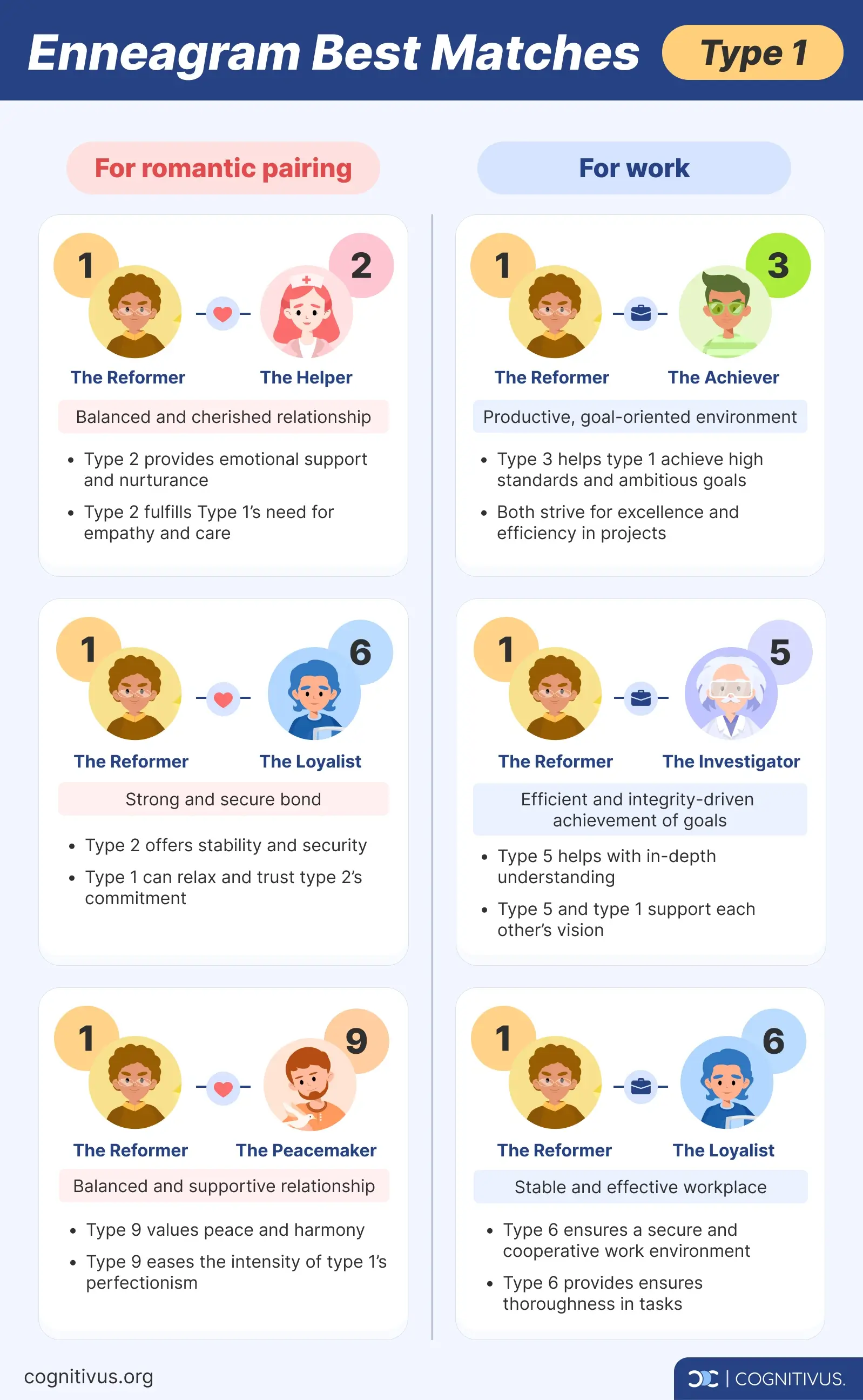
Best matches for romantic pairing
Let’s see who Type 1s are attracted to:
- Type 2 (The Helper): Type 2 provides emotional support and nurturance, complementing Type 1’s need for order with empathy and care. This dynamic helps Type 1 feel understood and cherished, laying the groundwork for a balanced relationship.
- Type 6 (The Loyalist): Type 6 offers stability and security, appreciating Type 1’s sense of duty. This reliable foundation allows Type 1 to relax and trust in their partner's commitment, creating a strong and secure bond.
- Type 9 (The Peacemaker): Type 9 values peace and harmony, helping to ease the intensity of Type 1’s perfectionism. This pairing creates a balanced and supportive relationship where both partners feel valued and understood.
Best matches for work
- Type 3 (The Achiever): Driven by success and productivity, Type 3 helps Type 1 achieve high standards and set ambitious goals. This dynamic creates a productive and goal-oriented work environment.
- Type 5 (The Investigator): Bringing knowledge and analytical skills, Type 5 complements Type 1’s principled approach with in-depth understanding. Together, they provide support for each other's vision, ensuring that goals are achieved with efficiency and integrity.
- Type 6 (The Loyalist): Providing reliability and teamwork, Type 6 ensures a secure and cooperative work environment. This collaboration helps to maintain a stable and effective workplace, where trust and loyalty are the cornerstones.
Compatibility with all types
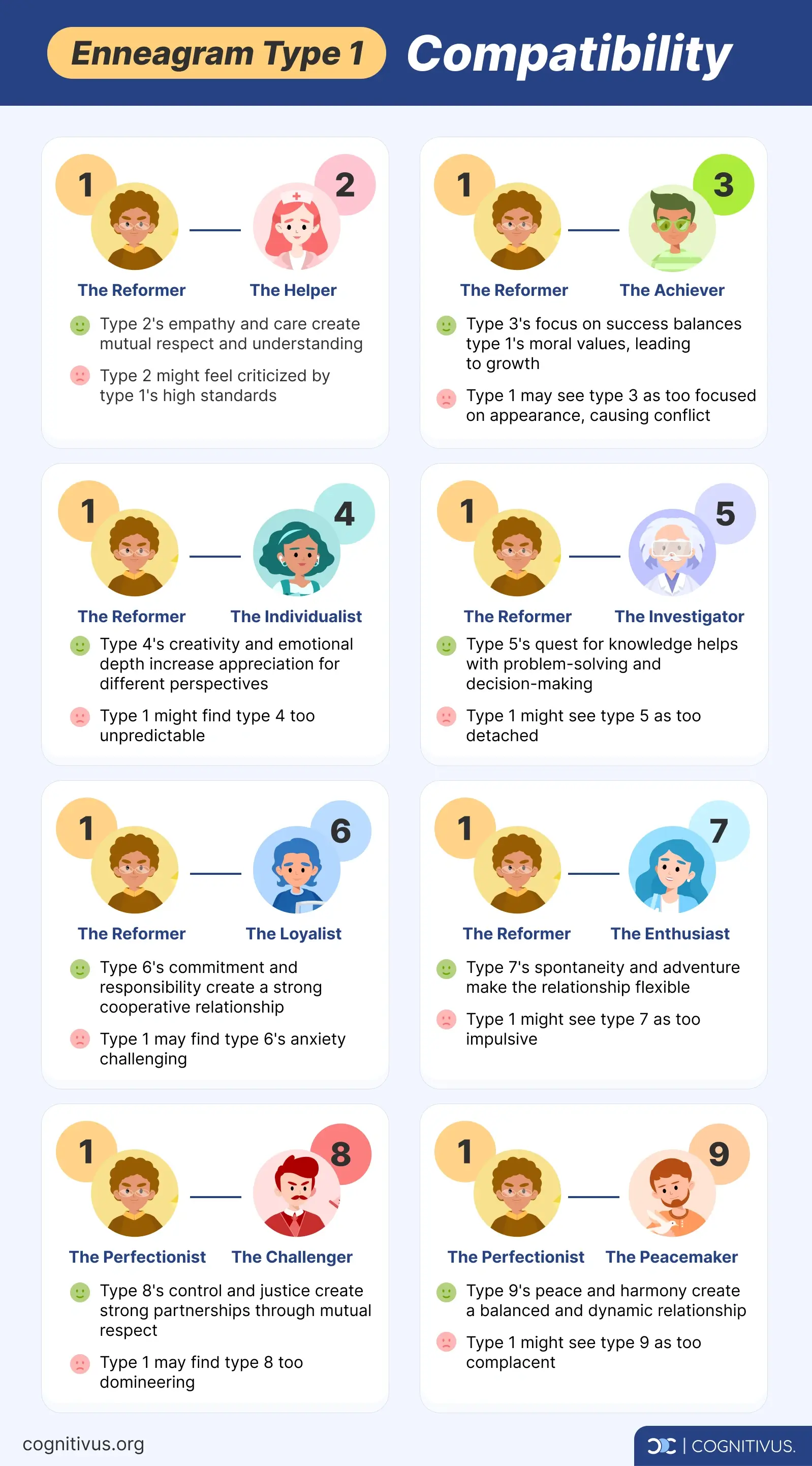
Type 1 vs Type 2 (The Helper)
- Strengths: Type 2’s empathy and care complement Type 1’s order and high standards, building mutual respect and understanding.
- Weaknesses: Type 2 might feel criticized by Type 1’s perfectionism, leading to feelings of inadequacy.
Type 1 vs Type 3 (The Achiever)
- Strengths: Type 1 focuses on perfection and moral values, while Type 3 emphasizes success and image. They balance each other's strengths and weaknesses, leading to growth.
- Weaknesses: Type 1 may see Type 3 as superficial, while Type 3 might view Type 1 as overly critical, causing conflict.
Type 1 vs Type 4 (The Individualist)
- Strengths: Type 1 values order and structure, while Enneagram Type 4 values individuality and emotional depth. They can learn to appreciate different perspectives and boost creativity.
- Weaknesses: Type 1 might find Type 4 too unpredictable and emotional, while Type 4 may see Type 1 as rigid and judgmental.
Type 1 vs Type 5 (The Investigator)
- Strengths: Type 1 is driven by principles and ethical conduct, while Type 5 seeks knowledge and understanding. This creates a balanced approach to problem-solving and decision-making.
- Weaknesses: Type 1 might see Type 5 as too detached and unemotional, while Type 5 may find Type 1's moral rigidity stifling.
Type 1 vs Type 6 (The Loyalist)
- Strengths: Both are committed and responsible, with Type 1 focusing on perfection and morality, and Type 6 emphasizing security and loyalty. Their shared sense of duty creates a strong, cooperative relationship.
- Weaknesses: Type 1 may find Type 6’s anxiety and need for reassurance frustrating, while Type 6 might feel pressured by Type 1's high standards.
Type 1 vs Type 7 (The Enthusiast)
- Strengths: Type 1 values structure and order, while Type 7 thrives on spontaneity and adventure. This dynamic can be challenging but also enriching, balancing discipline with flexibility.
- Weaknesses: Type 1 might see Type 7 as irresponsible and flighty, while Type 7 could find Type 1 too controlling and restrictive.
Type 1 vs Type 8 (The Challenger)
- Strengths: Type 1 seeks to improve through high standards, while Type 8 seeks control and justice. Their strong-willed natures can lead to powerful partnerships if they respect each other’s strengths.
- Weaknesses: Type 1 may see Type 8 as too aggressive and domineering, while Type 8 could find Type 1 overly critical and rigid.
Type 1 vs Type 9 (The Peacemaker)
- Strengths: Type 1 focuses on improvement and principles, while Type 9 values peace and harmony. This pairing creates a balanced dynamic, combining ambition with calmness.
- Weaknesses: Type 1 might view Type 9 as too complacent and passive, while Type 9 could see Type 1 as too demanding and critical.
10. Famous Enneagram Type 1
Type 1 celebrities
For Type Ones seeking inspiration, the lives of famous perfectionists offer valuable lessons. These individuals are examples of dedication, integrity, and high standards – all traits that resonate with Type Ones
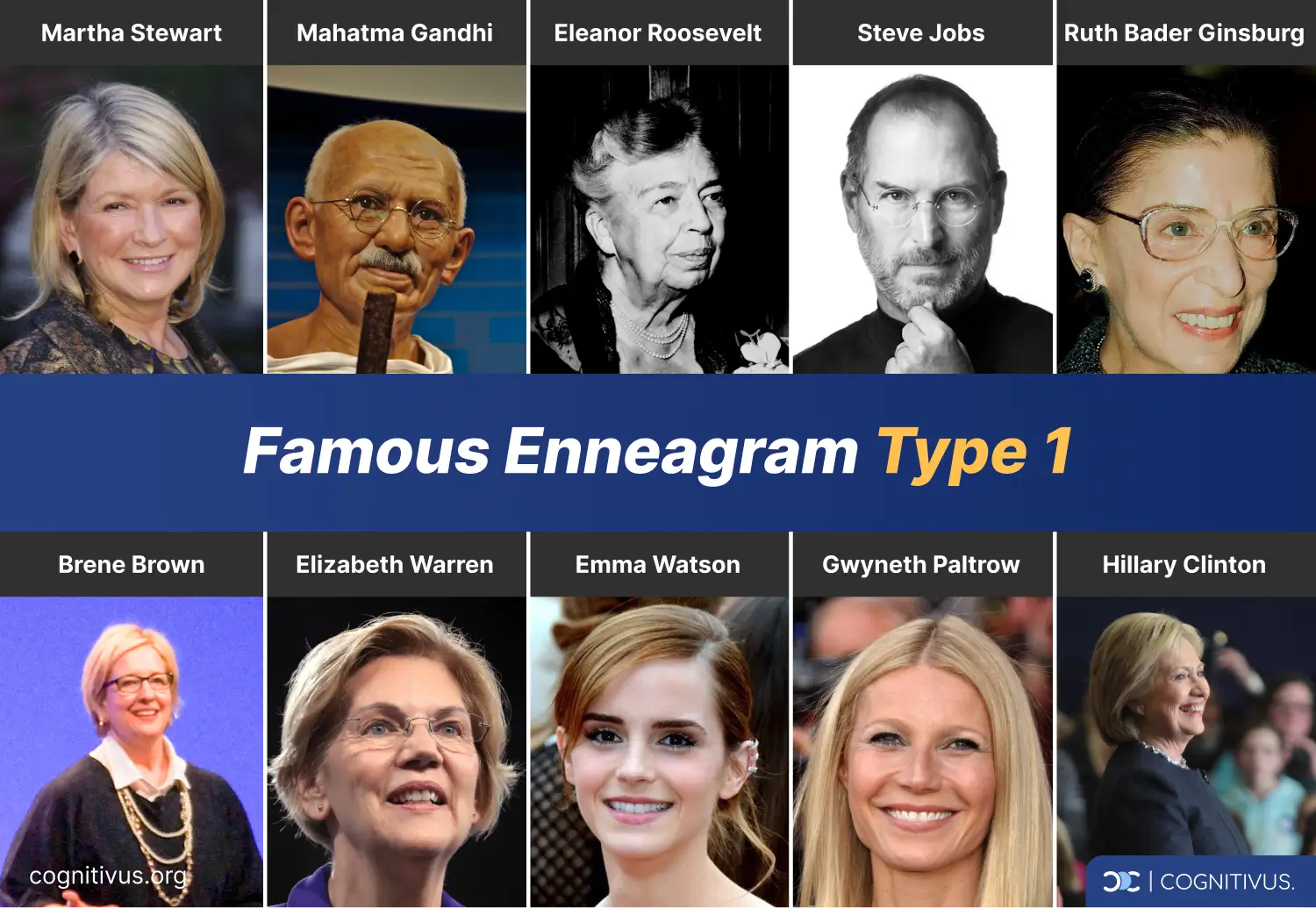
- Martha Stewart: Known for her dedication to precision and quality, Martha Stewart exemplifies the Type One commitment to high standards. She built a successful business empire by maintaining meticulous attention to detail and consistently striving for excellence.
- Mahatma Gandhi: Demonstrating a steadfast commitment to principles, Mahatma Gandhi instigated meaningful change on a global scale. His unwavering adherence to non-violence and justice is a great example for those seeking the moral integrity and idealism of Type Ones.
- Eleanor Roosevelt: As a First Lady and human rights advocate, Eleanor Roosevelt exhibited Type One traits through her dedication to social justice and ethical leadership. She tirelessly worked towards improving society and championing human rights, which might inspire Type Ones to stand up for what they believe in.
- Steve Jobs: The co-founder of Apple Inc., Steve Jobs, was known for his high standards and commitment to innovation. His pursuit of innovation and pushing boundaries revolutionized the technology industry.
- Ruth Bader Ginsburg: A Supreme Court Justice, Ruth Bader Ginsburg, demonstrated her Type One traits through her dedication to justice and equality. Her work in the legal field was marked by a relentless pursuit of fairness and integrity.
Other famous Type One celebrities include Brene Brown, Captain “Sully” Sullenberger, Elizabeth Warren, Emma Watson, Gwyneth Paltrow, Hillary Clinton, Immanuel Kant, Jane Fonda, Margaret Thatcher, Matt Damon, Michelle Obama, Morgan Freeman, and Nelson Mandela.
Type 1 fictional characters
Fictional characters also reflect the qualities of Type Ones, often serving as role models for integrity, diligence, and ethical behavior.

- Hermione Granger (Harry Potter): Known for her dedication to rules and high standards, Hermione Granger consistently strives for excellence. Her commitment to doing what is right, even in difficult situations, truly embodies the essence of a Type One..
- Lisa Simpson (The Simpsons): Lisa Simpson exhibits a strong sense of morality and justice in everything she does. She often challenges societal norms and fights for ethical causes, reflecting the Type One drive for improvement and integrity.
- Atticus Finch (To Kill a Mockingbird): Representing integrity and the fight for justice, Atticus Finch stands as a paragon of moral fortitude. His unwavering commitment to doing what is right, despite facing significant opposition, exemplifies the core values of Type Ones.
Frequently Asked Questions (FAQ)
Is there a difference between the perfectionist and the reformer?
The terms "Perfectionist" and "Reformer" both refer to Enneagram Type 1 personalities, but they highlight different aspects.
- "Perfectionist" emphasizes high standards, attention to detail, and the desire to avoid making mistakes. This term underscores the meticulous nature of Type Ones and their relentless and internal drive for flawlessness.
- "Reformer" highlights the drive to improve things, the desire for justice, and the aim to bring about positive change. It focuses on the proactive and principled aspect of Type Ones, showcasing their external desire to enact meaningful improvements.
Can you be more than one Enneagram type?
While each person primarily identifies with one Enneagram type, it's common to exhibit traits of other types, especially their wings. These wings – adjacent types on the Enneagram circle – add unique nuances to your core personality. For Type Ones, this means you may exhibit characteristics of either a Type Nine (1w9) or a Type Two (1w2). These wings add unique nuances to your core personality, but your main type remains dominant.
What MBTI type is Enneagram 1?
There isn't a direct correlation between Enneagram types and MBTI (Myers-Briggs Type Indicator) types because they are based on different theories and measure different aspects of personality. However, Enneagram Type 1, known for its focus on integrity, high standards, and a desire for improvement, often shares traits with several MBTI types.
Common MBTI types that might align with Enneagram Type 1 include:
- INTJ (Introverted, Intuitive, Thinking, Judging): Known for their strategic thinking and perfectionist tendencies.
- INFJ (Introverted, Intuitive, Feeling, Judging): Often principled and driven by a strong sense of right and wrong.
- ISTJ (Introverted, Sensing, Thinking, Judging): Detail-oriented and committed to duty and responsibility.
Remember, these are general trends and not strict rules. It's possible to be any MBTI type and still be an Enneagram Type 1, as both systems offer unique insights into different dimensions of personality. Though the dots can be connected between them, it's important to understand that the MBTI and Enneagram are different systems of personality typing. The MBTI focuses on cognitive functions and how people perceive the world and make decisions, while the Enneagram centers on motivational and emotional dynamics.
If delving deeper into the Enneagram intrigues you, "Nine Sapiens" is definitely a book worth exploring.

